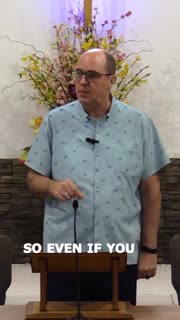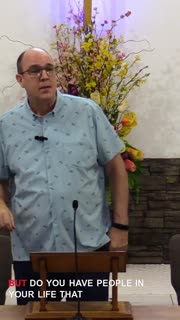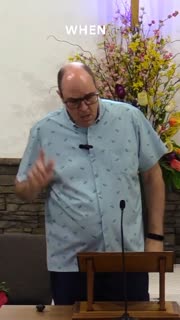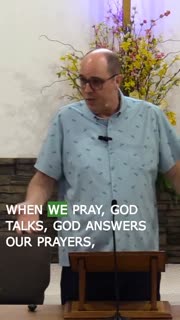Embracing Grace: Lessons from Jonah's Journey
Devotional
Sermon Summary
Bible Study Guide
Sermon Clips
1. "So even if you say, I don't believe it, I have a hard time grasping it, I don't know if this happened or not, but I want to listen to this story. When you look at the book of Jonah, Jonah was an Old Testament prophet and he is one of the very few prophets that actually crosses from major religions into the three major religions. Judaism acknowledged him as a prophet, Christianity acknowledges him as a prophet, Islam acknowledges him as a prophet. And in Judaism, they usually read every year at Yom Kippur this story with their entire Bible. This book is about this tribe of Jonah and they have come to these four chapters. There are only four chapters and only 48 verses, very short. So if you have never read the book of Jonah, I encourage you to go home today and read it, it's a very short and simple read, but it's very powerful." [02:00] (57 seconds)
2. "But do you have people in your life that you say, if I could live without them, I would be much better off? Now this person could be a family member, father, son, daughter, mother, sibling, uncle, niece, nephew. This person could probably be a work colleague, a boss, boss, or perhaps even a neighbor. This person that you avoid at all costs because you just don't like them, or you two just don't get along. Funny thing is, or I should say the sad thing is, that all of us have someone like that in our lives." [03:32] (45 seconds)
3. "When you have that in mind, I want you now to take place and put yourself in the shoes of Jonah. Here is this prophet in the Old Testament, Israelite, following the orders of Yahweh, and God tells him to go to the Ninevites and preach repentance. We look at this and we go, well, what's the big deal? So anyway, the Ninevites, they were Assyrian. Just so we understand who these people were that God was telling Jonah to go to, the Assyrian empire started around 2600 BC, and it went all the way to 609 BC, and that when it ceased to exist all the way down to 240. This empire went through the Bronze Age, the Iron Age. And they were the biggest military army, people, group of their region." [05:12] (70 seconds)
4. "Has God ever spoken to you to witness to someone? Has God ever said to you to go and ask for forgiveness for someone? Have you ever said, you know what, God, I will not do that? Congratulations, you're just like Jonah, right? We don't give slowly. We don't give slowly. We don't give slowly. We don't give slowly. We don't give slowly. Jonah slapped. We bash on him. How could you run away? But how many times have I seen this in my own life and in the church life? People that deliberately run away from the calling of God because they don't feel like it, or they don't want to do it." [15:10] (39 seconds)
5. "When we pray, God talks, God answers our prayers, but God also instructs us. And then God tells us to do something. We're like, you know what, I should tone down my prayer life because I don't want to be, I don't want my boat to be rocked. That's a sad way to go through your Christian life, by the way. Because if you don't take your orders from God, who are you taking them from? Yourself? How is that working out? As a pastor, I cannot tell you how many times I've heard people say, I knew God wanted me to do this, but I chose to do this. And you talk to them 10, 15, 20 years down the road, and their life is miserable. And sadly, they come up to you and they say, I wish I would have done that. I wish I would have heard God. I wish I would have submitted to his will. Now I'm paying the price." [15:50] (62 seconds)
6. "When running away from God, you will always find people that are willing to take you further away. Jonah goes down to Joppa, and what does he find? A ship that's going to Nineveh. No, a ship that is going to Tarshish. Just so a little geography here, Tarshish was at the time, the last known city, of the world. So Joppa is now where Tel Aviv is. Nineveh is where today Mosul is. This is about 500 kilometers east. Tarshish is around Spain, Gibraltar area. That's 2,500 miles west. So God tells Jonah to go 500 miles east, and he says, I'm going to go 2,500 miles west. That's how far he wanted to run away from God." [16:45] (59 seconds)
7. "Your disobedience will be costly to you and others. Jonah says, you know what? I'm good. I got it made. God told me to go that way, and I'm going that way. I found a ship, a cargo ship. I'm in the basement. I'm sleeping my, sleeping away, and a storm rises. As a passage that we just read, what did they start doing? They started throwing their stuff, their cargo into the ocean in order not to drown. Poor sailors, eh? They had no idea what was going on. But now their cargo is in the deep ocean because of Jonah." [20:20] (53 seconds)
8. "Disobedience from God is disobedience. Disobedience from God is disobedience. Disobedience from God is disobedience nonetheless. And we all must know that we're so quick to point the finger at Jonah and say, how could you do that? But how many times do we do that in our lives? Did the Assyrians deserve repentance? If we were to look at their history, and there's plenty of history channels that tell their story, you and I would probably say no too. But when God says, I want them to repent, that means that there's something more at stake in this life than what you want or what I want." [25:42] (40 seconds)
9. "The Bible instructs us to pray for our friends, okay, you're nodding your head. The Bible tells us to pray for our enemies. Women prayer group, Monday night, one hour, just pray for your enemies. long as you guys don't start pointing fingers at one another, right? You're my enemy, so I got to pray for you. Oh boy, oh boy. Big trouble. But just imagine, pray for your enemies. That's all you do. As we did before, we pray for our family. We pray for travel. We pray for those who are sick. We pray for everyone around us. But do we pray for our enemies? That they too may know the Lord. That they too may turn from their wicked ways and repent and serve God in the way that you and I are doing." [27:32] (59 seconds)
10. "You can always turn back to God. God will never say you turned your back on me 20 years ago. Guess what? I ain't hearing your prayers anymore. God will not say that. And the same way that we see in the book of Jonah, grace and sin, sin and grace. Sin is us running away from God. Grace is God running after us, welcoming us in. It doesn't matter if you did this 10, 20, 30, 40 years ago. God is in the business of rescuing sinners. As the title of our series is Rescuing Renegades. Keep that in mind as we move forward in this series, because we know that all of us at one point or another have done what Jonah has done. And all of us at one point or another need to turn back and submit our will to God. Amen." [31:02] (59 seconds)
Ask a question about this sermon
2. "But do you have people in your life that you say, if I could live without them, I would be much better off? Now this person could be a family member, father, son, daughter, mother, sibling, uncle, niece, nephew. This person could probably be a work colleague, a boss, boss, or perhaps even a neighbor. This person that you avoid at all costs because you just don't like them, or you two just don't get along. Funny thing is, or I should say the sad thing is, that all of us have someone like that in our lives." [03:32] (45 seconds)
3. "When you have that in mind, I want you now to take place and put yourself in the shoes of Jonah. Here is this prophet in the Old Testament, Israelite, following the orders of Yahweh, and God tells him to go to the Ninevites and preach repentance. We look at this and we go, well, what's the big deal? So anyway, the Ninevites, they were Assyrian. Just so we understand who these people were that God was telling Jonah to go to, the Assyrian empire started around 2600 BC, and it went all the way to 609 BC, and that when it ceased to exist all the way down to 240. This empire went through the Bronze Age, the Iron Age. And they were the biggest military army, people, group of their region." [05:12] (70 seconds)
4. "Has God ever spoken to you to witness to someone? Has God ever said to you to go and ask for forgiveness for someone? Have you ever said, you know what, God, I will not do that? Congratulations, you're just like Jonah, right? We don't give slowly. We don't give slowly. We don't give slowly. We don't give slowly. We don't give slowly. Jonah slapped. We bash on him. How could you run away? But how many times have I seen this in my own life and in the church life? People that deliberately run away from the calling of God because they don't feel like it, or they don't want to do it." [15:10] (39 seconds)
5. "When we pray, God talks, God answers our prayers, but God also instructs us. And then God tells us to do something. We're like, you know what, I should tone down my prayer life because I don't want to be, I don't want my boat to be rocked. That's a sad way to go through your Christian life, by the way. Because if you don't take your orders from God, who are you taking them from? Yourself? How is that working out? As a pastor, I cannot tell you how many times I've heard people say, I knew God wanted me to do this, but I chose to do this. And you talk to them 10, 15, 20 years down the road, and their life is miserable. And sadly, they come up to you and they say, I wish I would have done that. I wish I would have heard God. I wish I would have submitted to his will. Now I'm paying the price." [15:50] (62 seconds)
6. "When running away from God, you will always find people that are willing to take you further away. Jonah goes down to Joppa, and what does he find? A ship that's going to Nineveh. No, a ship that is going to Tarshish. Just so a little geography here, Tarshish was at the time, the last known city, of the world. So Joppa is now where Tel Aviv is. Nineveh is where today Mosul is. This is about 500 kilometers east. Tarshish is around Spain, Gibraltar area. That's 2,500 miles west. So God tells Jonah to go 500 miles east, and he says, I'm going to go 2,500 miles west. That's how far he wanted to run away from God." [16:45] (59 seconds)
7. "Your disobedience will be costly to you and others. Jonah says, you know what? I'm good. I got it made. God told me to go that way, and I'm going that way. I found a ship, a cargo ship. I'm in the basement. I'm sleeping my, sleeping away, and a storm rises. As a passage that we just read, what did they start doing? They started throwing their stuff, their cargo into the ocean in order not to drown. Poor sailors, eh? They had no idea what was going on. But now their cargo is in the deep ocean because of Jonah." [20:20] (53 seconds)
8. "Disobedience from God is disobedience. Disobedience from God is disobedience. Disobedience from God is disobedience nonetheless. And we all must know that we're so quick to point the finger at Jonah and say, how could you do that? But how many times do we do that in our lives? Did the Assyrians deserve repentance? If we were to look at their history, and there's plenty of history channels that tell their story, you and I would probably say no too. But when God says, I want them to repent, that means that there's something more at stake in this life than what you want or what I want." [25:42] (40 seconds)
9. "The Bible instructs us to pray for our friends, okay, you're nodding your head. The Bible tells us to pray for our enemies. Women prayer group, Monday night, one hour, just pray for your enemies. long as you guys don't start pointing fingers at one another, right? You're my enemy, so I got to pray for you. Oh boy, oh boy. Big trouble. But just imagine, pray for your enemies. That's all you do. As we did before, we pray for our family. We pray for travel. We pray for those who are sick. We pray for everyone around us. But do we pray for our enemies? That they too may know the Lord. That they too may turn from their wicked ways and repent and serve God in the way that you and I are doing." [27:32] (59 seconds)
10. "You can always turn back to God. God will never say you turned your back on me 20 years ago. Guess what? I ain't hearing your prayers anymore. God will not say that. And the same way that we see in the book of Jonah, grace and sin, sin and grace. Sin is us running away from God. Grace is God running after us, welcoming us in. It doesn't matter if you did this 10, 20, 30, 40 years ago. God is in the business of rescuing sinners. As the title of our series is Rescuing Renegades. Keep that in mind as we move forward in this series, because we know that all of us at one point or another have done what Jonah has done. And all of us at one point or another need to turn back and submit our will to God. Amen." [31:02] (59 seconds)










